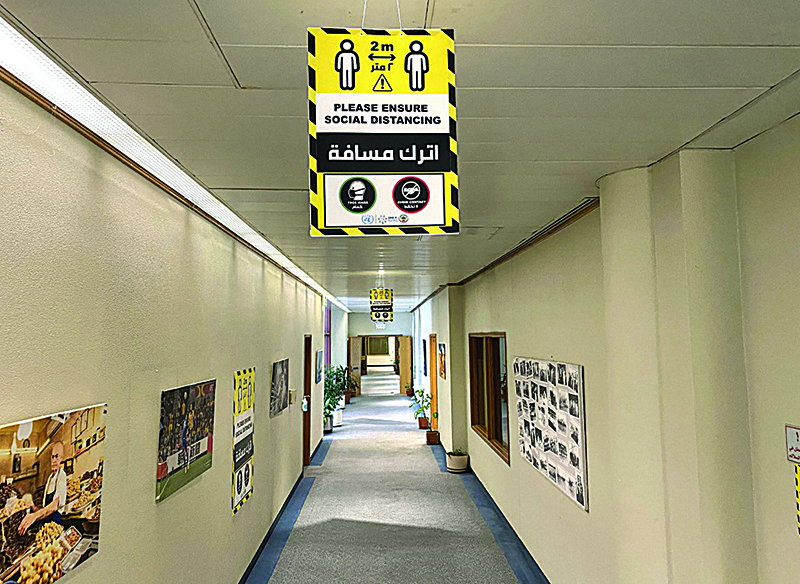 KUWAIT: A sign encouraging social distancing hangs from the ceiling in the corridor of a building in Kuwait. —KUNA
KUWAIT: A sign encouraging social distancing hangs from the ceiling in the corridor of a building in Kuwait. —KUNAKUWAIT: Since around December 2019, the world has been experiencing a health crisis like no other due to COVID-19, where there was significant increase in mortality and morbidity. The pandemic has had a major effect on our lives that can be stressful and overwhelming, triggering potent, sometimes unexplainable emotions in adults and children alike. Public health measures, such as social distancing, are necessary to reduce the spread of the virus, but it also makes people feel isolated, lonely and anxious.
In this regard, Assistant Professor in Psychology Dr Wasmiya Al-Abbad said that the way people adapt to these situations “reflects their ability to overcome these unusual circumstances by means that restore psychological balance.” She added that with the authorities broadcasting health instructions and information about the virus, people were able to acknowledge and return to their normal lives with precautionary measures, which eased their anxiety and fear.
The impact of social distancing and other preventive steps on the lives of individuals can lead to obsessive behavior due to fear of infection, which became the drive for Badriyah Al-Hassan and Fahad Shehab to get vaccinated as soon as the shots arrived. Badriyah pointed out that during the pandemic, she relied on social media to contact and keep in touch with her family, especially the elders, which contributed to relieving her anxiety. Most people, including Shehab, felt positive and energetic when they began to cope with the virus and return to their usual normal activities such as going back to work, shopping and family visits.
Uncertainty and acclimation
Professor of Psychology at Kuwait University Dr Hessa Al-Nasser said that mask-wearing, sanitizing, and social distancing became daily habits. However, uncertainty and acclimation became of people’s daily routines, “even the way we greet each other,” she noted. As His Highness the late Amir Sheikh Sabah Al-Ahmad Al-Jaber Al-Sabah stated, “the world won’t be the same as it was before the pandemic.” In this vein, Social Planning Professor Seham Al-Qabandi advised people not to surrender to negative feelings and always find a way to live with changes happening in a positive manner.
She noted that epidemics existed a long time ago, but people have been able to live with them, regardless of individual, social and psychological consequences. COVID was, and still is, a “scary” and somehow “weird” outbreak to adapt to, as it does not only disrupt a person’s physical health, but also their wellbeing as a social and interactive creature, Qabandi pointed out. Nevertheless, people managed to face this “scarecrow” of a pandemic by returning to their respective lives, one way or the other, she indicated. —KUNA










